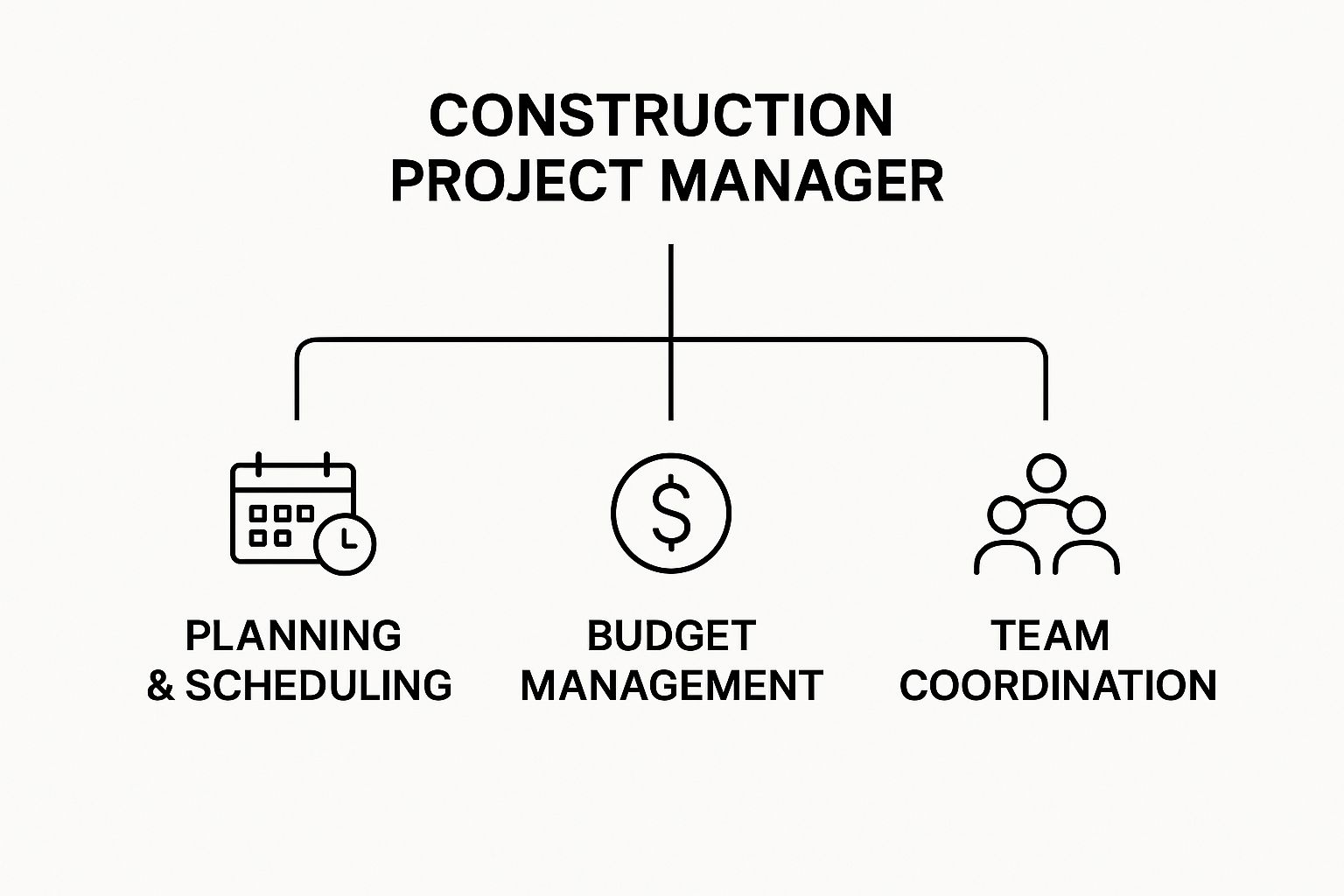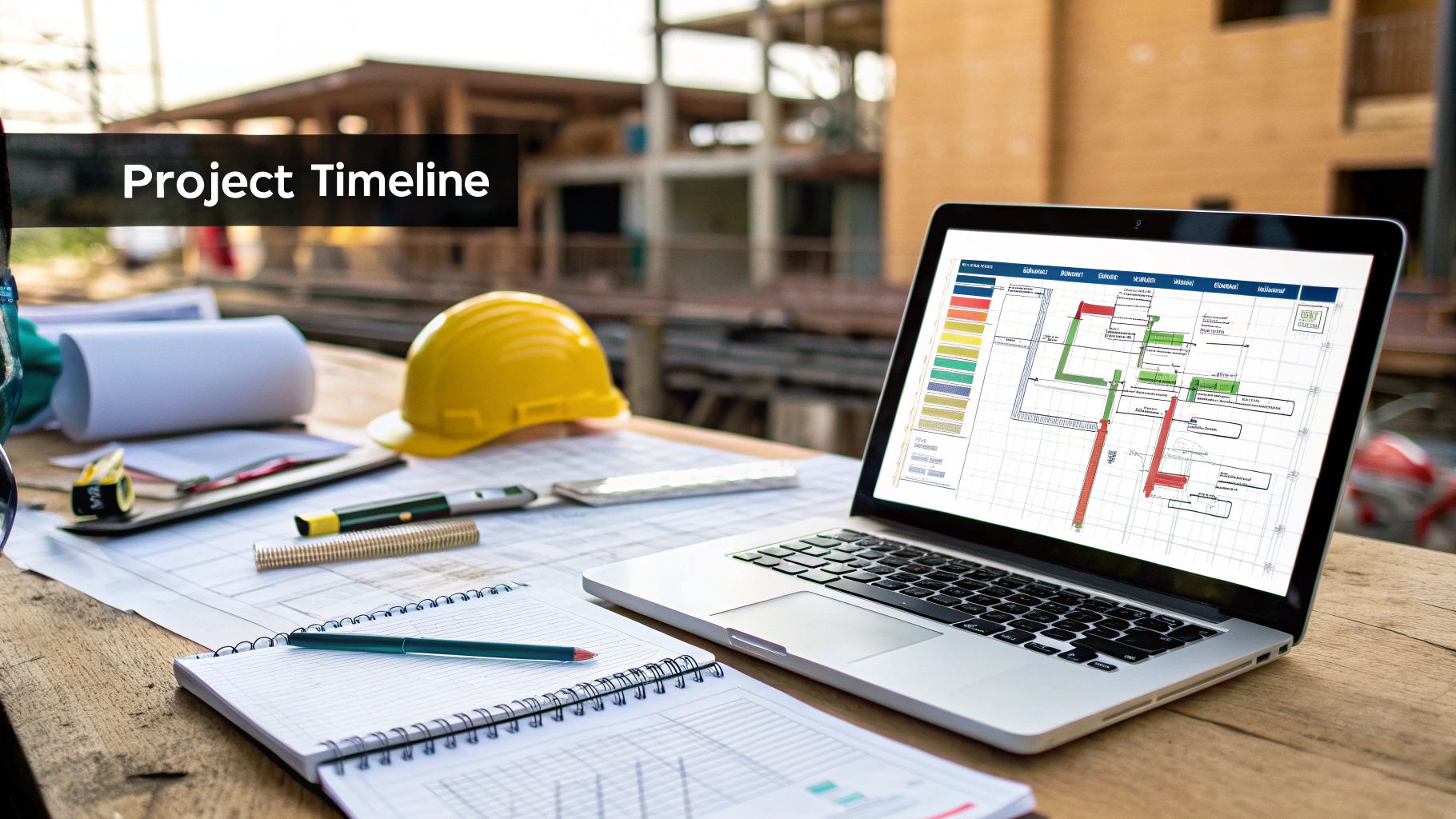A construction project manager is the central figure responsible for a project's success, from the very first blueprint to the final handover. Think of them as the conductor of an orchestra, making sure the architects, engineers, contractors, and clients all work in perfect harmony. Their job is to turn a plan into a physical building, keeping everything on schedule and within budget.
The True Role of a Construction Project Manager
So, what does a construction project manager really do?
Imagine them as the single point of control for an entire build. They are not the ones laying bricks or operating cranes; instead, they manage the incredibly complex dance between resources, timelines, and people. At its core, their role is to provide clear direction and maintain a delicate balance between the competing demands of cost, quality, and safety.
This involves a huge range of duties. In Australia, their official responsibilities cover everything from planning and organising to directing and coordinating the whole construction process. They scrutinise technical drawings, prepare tenders for subcontractors, and manage all the moving parts, ensuring every detail meets both performance and legislative standards.
The image below breaks down the core pillars of their responsibilities.

As you can see, it is a constant juggle between forward-thinking planning, tight financial control, and hands-on team leadership.
A project manager’s real value is measured by their ability to see problems coming and solve them before they disrupt the schedule or budget. They are the strategic thinkers who steer the ship through the inevitable storms of a project.
Core Responsibilities at a Glance
To give you a clearer picture, here is a breakdown of what a construction PM is typically accountable for at each stage of a project.
| Project Phase | Key Responsibilities and Activities |
|---|---|
| Pre-Construction | Defining project scope, developing budgets, creating schedules, risk assessment, and selecting the project team. |
| Construction | Overseeing daily site operations, managing contracts, monitoring quality control, and ensuring strict safety compliance. |
| Post-Construction | Managing project closeout, final inspections, handling documentation, and coordinating the final handover to the client. |
Ultimately, these responsibilities all feed into one main goal: delivering a successful project.
A modern construction PM's role is also evolving. It now includes understanding and weaving in new technologies to boost efficiency. For example, staying current with advancements like advanced drone use in construction for site surveys and progress monitoring is no longer a "nice-to-have"—it is becoming critical for staying competitive.
At the end of the day, their job is to deliver a finished structure that meets every single requirement, turning a client's vision into a tangible, valuable asset.
A Day in the Life of a Project Manager
So, what does a construction project manager really do? To get a feel for it, you have to step into their work boots for a day. While no two days are ever the same, they are always a dynamic blend of hands-on site work and high-level strategic thinking. This is not your typical nine-to-five desk job.
Your morning often kicks off right on-site, boots on muddy ground. The first order of business might be a safety briefing with the crew, followed by a walk-through with the site foreman to see how progress stacks up against the schedule. This is where the plans meet reality, and a sharp eye for detail is crucial for spotting small issues before they escalate into major delays.

From the Site to the Boardroom
By midday, the scenery often shifts to a temporary site office or a nearby café. Here, the focus pivots to problem-solving. You might be fielding calls about an unexpected materials shortage, cross-checking subcontractor invoices, or updating the project’s risk register. A huge part of the role is documentation, and using a solid contractor daily report template can make this daily grind much more manageable.
The afternoon could easily be spent back in a corporate setting. This is prime time for stakeholder management—perhaps presenting updated budget forecasts to the client or negotiating a change order with the architectural team. This constant context-switching is a defining part of the job.
The essence of the role is organised chaos management. A project manager is constantly pulled in multiple directions, and their success hinges on their ability to prioritise, communicate clearly, and make decisive calls under pressure.
This demanding schedule is reflected in how they work. Data from Jobs and Skills Australia shows that 90% of Construction Project Managers work full-time. They typically clock an average of 47 hours per week, which is a fair bit more than the 44-hour average for all Australian workers. It is a real commitment. You can explore more about these professional work patterns and other insights on the construction manager role on Jobs and Skills Australia.
The Essential Skills for On-Site Success
To excel as a construction project manager, you need more than just a deep knowledge of the build itself; you have to know how to lead the builders. It is this blend of technical expertise and people skills that separates a good manager from a great one.
First, let's talk about the hard skills. These are the concrete, teachable abilities that are absolutely non-negotiable. A manager must be able to read complex architectural blueprints and engineering schematics flawlessly. Even a tiny misinterpretation here can spiral into expensive rework down the line.
On top of that, fluency in modern project management software is a must. Platforms like Procore or Aconex are not just tools; they are the central nervous system of a modern job site, handling everything from document control to daily logs. Without a firm grip on these, a project can quickly get lost in a sea of paperwork and miscommunication.
Mastering Both Sides of the Job
Just as important are the so-called soft skills. These interpersonal abilities are often trickier to measure but are the real secret to steering a project across the finish line. They dictate how well a manager can motivate and direct a diverse team of trades, subcontractors, and other professionals.
A project manager’s role is fundamentally about influence, not just instruction. They must earn the respect of their team through competence and clear communication, turning a group of individuals into a cohesive unit focused on a single goal.
The most effective managers are masters of these influential skills:
- Leadership: The ability to inspire the crew, delegate tasks intelligently, and keep morale high, especially when the pressure is on and deadlines are tight.
- Negotiation: The expertise to resolve contract disputes with suppliers or navigate change requests from clients, all without blowing the budget.
- Communication: The talent for keeping everyone—from the client and investors to the labourers on-site—perfectly aligned, informed, and on the same page.
Finding the right balance is the key to building a successful career in this field. For anyone looking to sharpen their professional toolkit, a great first step is understanding how to start balancing soft skills and hard skills for success.
How Success Is Measured on a Project

Simply getting a building to the finish line does not automatically make a project a success. A construction project manager’s performance is judged against a strict set of key performance indicators (KPIs) that go far beyond the ribbon-cutting ceremony. These metrics create a clear, objective framework for what a successful build actually looks like.
These indicators are often called the "four pillars" of project success, forming the very foundation of a well-managed job. A manager's ability to deliver on these four fronts is what truly defines their competence and is how clients and employers ultimately measure their performance.
The Four Pillars of Project Success
At its heart, project success is a constant balancing act between these critical elements. Neglecting one pillar to prop up another is a common path to project failure. A great manager knows how to keep all four in perfect alignment.
The primary pillars are:
- On-Time Delivery: This means hitting the project schedule without costly delays. It demands meticulous planning, proactive problem-solving, and the seamless coordination of all trades and suppliers to hit every single milestone.
- On-Budget Completion: Staying within the allocated budget is more than just tracking expenses. It involves sharp forecasting, finding cost-effective alternatives through value engineering, and skilfully managing any variations or unexpected changes.
- Specified Quality Standards: The project must be built to the exact quality and specifications outlined in the contract and blueprints. This requires rigorous quality assurance checks and an unwavering commitment to craftsmanship from start to finish.
- Impeccable Safety Record: A successful project is a safe project. Maintaining a zero-harm site environment is paramount, demanding strict adherence to safety protocols and a culture of vigilance that protects every person on site.
A construction project manager's job is not just to build a structure; it is to deliver value. Success is delivering the right building, at the right price, at the right time, and ensuring everyone goes home safely at the end of the day.
Ultimately, these four pillars are completely interconnected. A safety incident can trigger delays, a quality issue can lead to budget blowouts, and rushing to meet a deadline can compromise both quality and safety. This is the complex reality of what a construction project manager juggles every single day.
Building a Career in Construction Management

So, you are inspired by what a construction project manager does and are thinking of making it your career? It is a rewarding journey, but it is one you build step-by-step. Nobody walks straight into managing a multi-million-dollar skyscraper.
The path almost always starts in a more junior role, like a project coordinator or an assistant project manager. These positions are your boot camp, giving you essential, on-the-ground experience with the day-to-day mechanics of how a project actually works.
As you prove yourself and gain that hands-on knowledge, the natural progression is to start managing smaller projects on your own. From there, you gradually take on larger and more complex developments. Gaining a diverse portfolio of projects—from residential builds to large-scale commercial or civil infrastructure—is absolutely critical. This variety is what builds a robust skillset and makes you a versatile and highly valuable manager.
Advancing Your Career and Earning Potential
To really accelerate your career, pursuing professional accreditations is a game-changer. Gaining credentials from respected bodies like the Chartered Institute of Building (CIOB) or the Australian Institute of Project Management (AIPM) sends a clear signal to employers about your competence and professionalism. It is proof of your commitment to industry best practices.
A successful career in construction management is built on a foundation of proven results. Each project you deliver successfully becomes a testament to your skills, opening doors to greater responsibilities and more significant projects.
Naturally, as your experience and responsibilities grow, so does your paycheque. A construction project manager's salary in Australia directly reflects the critical nature of their work. While someone starting out might see a salary around AUD 72,800, the average annual salary sits at approximately AUD 153,700. For highly experienced managers overseeing major projects, it is not uncommon to command salaries upwards of AUD 245,400 per year. You can get a deeper dive into these salary trends from Leverage Edu.
This earning potential is shaped by a few key factors:
- Project Complexity: Bigger, more technical projects simply command higher salaries.
- Location: Major cities like Melbourne and Sydney often offer greater compensation.
- Experience Level: Years of proven success and a solid track record directly impact your earning potential.
For anyone looking to take that next step, understanding the local market is crucial. You can find excellent insights into the current landscape by exploring guides on project manager recruitment in Melbourne and other major hubs.
Frequently Asked Questions
It is natural to have questions about what a construction project manager really does day-to-day. To clear things up, we have put together answers to some of the most common queries we hear about this challenging but incredibly rewarding profession.
What Is the Biggest Challenge a Construction Project Manager Faces?
Without a doubt, the single greatest challenge is managing uncertainty. Construction projects are complex beasts, and something unexpected is always lurking around the corner—whether it is a freak weather event, a critical supply chain breakdown, or a last-minute design change from the client.
A top-tier manager shines not just by reacting to these problems, but by anticipating them. They build robust contingency plans and communicate with absolute clarity to resolve issues before they can derail the project’s iron triangle: time, cost, and quality.
Do You Need an Engineering Degree to Become a Project Manager?
While a degree in a related field like civil engineering, architecture, or construction management gives you a fantastic technical head start, it is by no means the only way in. Many of the industry's most successful managers started their careers on the tools, building their expertise through years of practical, on-the-ground experience.
Often, they add formal project management qualifications later to round out their hands-on knowledge. At the end of the day, exceptional leadership, sharp financial acumen, and superb organisational skills are just as vital as any technical background.
The most effective managers blend practical site knowledge with high-level strategic thinking. This combination of experience is what makes them so good at foreseeing and solving real-world problems.
How Is Technology Changing the Project Manager's Role?
Technology is not just tweaking the role; it is fundamentally reshaping it. Tools like Building Information Modelling (BIM) allow managers to create detailed digital twins of a project, enabling far better planning and clash detection before a single shovel hits the dirt.
Likewise, specialised software like Procore centralises all communication, documentation, and reporting onto one platform. This empowers managers to make smarter, data-driven decisions, drastically improving collaboration and risk management. It is also now common to see drones used for site surveys and safety checks, delivering instant, accurate data.
What Is the Difference Between a Site Manager and a Project Manager?
This is a common point of confusion, so let's break it down. Think of it this way: the site manager’s world is the construction site itself. Their focus is purely on the day-to-day, hands-on operations—managing the workforce, enforcing safety rules, and overseeing the physical build.
The project manager, however, operates at a much higher altitude. They are responsible for the entire project lifecycle, from the initial concept right through to the final handover. They manage the budget, the master schedule, stakeholder relationships, and all the contractual details. The site manager typically reports directly to the project manager on daily progress and any on-site issues. As you prepare for interviews for either role, it is a smart move to review a guide on how to ace your online interviews to ensure you present your skills effectively.
At Redwolf Rosch, we specialise in connecting talented professionals with leading organisations. If you are looking for a trusted, high-performing recruitment partner to find your next project leader or to take the next step in your own career, get in touch for an introductory discussion today at https://redwolfrosch.com.au.
 Submit CV
Submit CV Submit vacancy
Submit vacancy  Call for a Candidate
Call for a Candidate